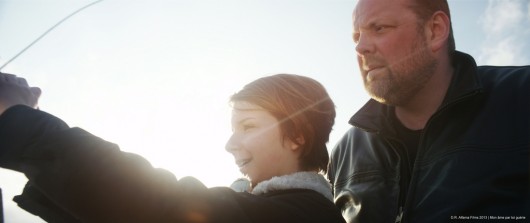EIFF REVIEW: The downside of altruism in One of a Kind
Posted on September 22, 2014 By Derek Owen Entertainment, entertainment, Film, Front Slider
 Can humans help themselves by helping others? Veteran French auteur Francois Dupeyron explores this very complex question in his 17th film One of a Kind (original French Title: Mon âme par toi guérie, or My Soul Healed By You). It screens Saturday, Sept. 27 at 2 pm as part of the Edmonton International Film Festival.
Can humans help themselves by helping others? Veteran French auteur Francois Dupeyron explores this very complex question in his 17th film One of a Kind (original French Title: Mon âme par toi guérie, or My Soul Healed By You). It screens Saturday, Sept. 27 at 2 pm as part of the Edmonton International Film Festival.
This insightful and intelligent film tells the story of Fredi (played by Gregory Gadebois), a middle aged ne’er-do-well whose life is going nowhere fast until he discovers he has the magical ability to heal others by touch. He refuses to use his power until one night while out on his motorbike he accidentally hits a young boy crossing the street. Stricken with guilt, Fredi vows from then on to use his gift to help others.
Dupeyron uses an unsophisticated directing style that stands apart from the usual French filmmaking stereotype to flesh out the storyline with seemingly unsophisticated characters. He also almost exclusively relies on natural light, which gives his film a gritty, realistic, North American appearance. Much of the dialogue comes off as stilted, but as the characters unfold, we learn this is exactly what the filmmaker intends. The film is about people struggling so much with life that even their capacities to communicate are limited.
 Some of the themes go deeper than expected. The injured line-up to be healed, and they struggle to offer their healer kind words in return. One man calls Fredi a charlatan after he refuses money for his services. These generic valium in india characters stream in and out of scenes over the course of the film, and don’t seem to care about Fredi beyond what he can do for them. Is this how we should act towards those who help us? It seems to be the case in an individualistic, selfish, consumerist, every-man-for-himself world. Dupeyron draws the conclusion that life on the fringes is one of the few fitting places for someone like Fredi, if only because he is a kind, caring person who isn’t interested in adding to any corporate bottom line.
Some of the themes go deeper than expected. The injured line-up to be healed, and they struggle to offer their healer kind words in return. One man calls Fredi a charlatan after he refuses money for his services. These generic valium in india characters stream in and out of scenes over the course of the film, and don’t seem to care about Fredi beyond what he can do for them. Is this how we should act towards those who help us? It seems to be the case in an individualistic, selfish, consumerist, every-man-for-himself world. Dupeyron draws the conclusion that life on the fringes is one of the few fitting places for someone like Fredi, if only because he is a kind, caring person who isn’t interested in adding to any corporate bottom line.
With his rhetorical iron fist solidly inside a velvet glove, Dupeyron makes some darkly astute observations on the nature of humanity. When Fredi is confronted by the mother of the little boy he hit at the hospital after he comes to try to heal him, her anger quickly dissolves into a teary jeremiad about the absence of God, and the injustice of a lack of comfort provided her. The woman comes off as spiritually blind, given the simple evidence of Fredi’s close physical presence, and the bright light of the sun shining strongly in her face – in all of our faces in fact, so bright that it almost washes out the screen at times. How about that for symbolism smacking you in the face?
Generally French cinema is more subtle than this, but then again, there are plenty of people in real life who are blinded by their own self absorption.













